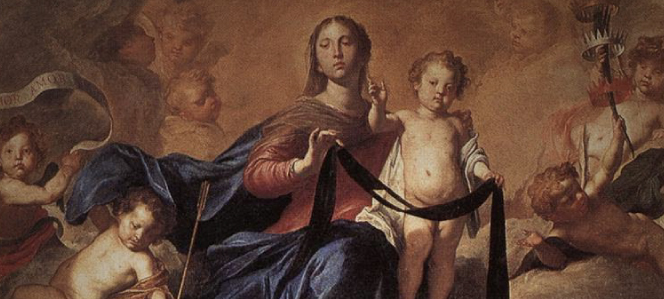In the imagination of many Catholics, the title of the Mother of God as “Our Lady of Mt. Carmel” evokes the devotion of the brown scapular with its assurances of the grace of final perseverance, humility, and contrition that are promised to the wearer of the scapular at the moment of death.
Yet the meaning of this title of Our Lady is deeper than this popular devotion.
The Mother of God is the patroness of the Order of Carmelites, professed men and women religious who trace their spiritual lineage to the prophet Elijah, who lived on Mt. Carmel in the Holy Land.
The Mt. Carmel of Elijah would have been a strange, off-putting place to us. The prophets of Israel were not simply solitary figures, but “guilds” or “bands” who inhabited the wilderness of Mt. Carmel. These prophets would have been fearsome folks, known for their asceticism, trances, and visions, associated with powers that to the modern mind would seem like sorcery. To us, accustomed to a religion that is benignly therapeutic, they would seem wild, untamed and dangerous.
The identification of the Mother of God with all this should then strike us as odd. How many of us imagine Our Lady as being anything like those prophets? Or like Elijah? She is likely for most of us a “gentle woman” who speaks quiet words of wisdom and consolation.
And this is true. But it is not the whole truth of the Mother of our Lord.
Our Lady does not speak often in the Scriptures, but what she does say is always significant. Her longest speech in the Bible is recorded in the Gospel of Luke. It is known to us as the “Magnificat.”
If we suspend from our minds the placid musical settings that are often served up with the Blessed Mother’s “Magnificat” and consider her words in and of themselves, we might note with surprise that there is something fierce about the mother of Christ. She speaks in her “Magnificat” like Elijah.
Her words testify to the Lord who arrives with all his power to set right a world gone wrong.
The spiritual children of Our Lady of Mount Carmel are a sign of contradiction to the world. Their way of life is intentionally severe, displaying to us, as the prophets of the Bible do, that this world is not ultimate. However important our concerns and preoccupations might be, this life will pass away, and in the end what remains of ultimate importance is not the kinds of things that we imagine to be of such worldly significance. What matters in the end is God and what God has done for us in Christ.
Remember this: without God and what God has done for us in Christ, nothing of who we are matters at all.
Our Lady of Mt. Carmel shouts this truth out to a world absorbed in the ego and pre-occupied with the trivial. She speaks and tells us, as Elijah and the prophets did centuries ago, to repent and believe—for the Lord in his might is coming and he is coming to set this world right.
